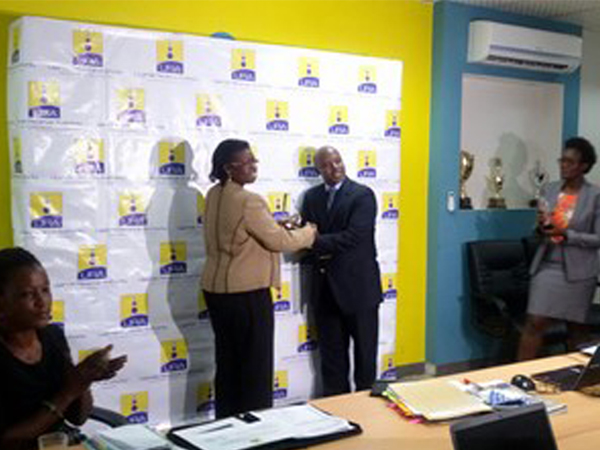Reforms undertaken by the two partners contributed to a reduction in customs clearance time, enabled URA generate more revenue to fund national programs and contributed to improved ranking of Uganda in World Bank Doing Business report 2016 Kampala, 18th December 2015: Uganda Revenue Authority (URA) recognised TradeMark Africa (TMA)-Uganda, in appreciation of the support rendered under the Managing Compliance Programme reforms which have led to increased efficiency in revenue collection.

The reforms include the Authorised Economic Operator (AEO) Initiative, the Customs Management System of ASYCUDA World and the Electronic Cargo Tracking System (ECTS). Moses Sabiiti, on behalf of TMA, received the award in a colourful ceremony.
TMA supported URA through funding from DFID, The Dutch Embassy and Sweden. Increased efficiency of customs is important as URA collects the Government of Uganda’s tax revenues which are used to fund the country’s budget for infrastructure development, Universal Primary Education and Public Medical Access. Customs revenues contribute over 50% of Uganda’s tax revenues.
During the event, URA Commissioner General, Ms. Doris Akol, said “The Customs Reforms funded by TMA achieved all planned outputs under ASYCUDA World, AEO and ECTS; this support has put URA Customs in the leading position in trade facilitation in the region and equipped URA to further generate more revenue to fund national programs.
We appreciate TMA for being demand driven, Iterative and flexible. These reforms have led to a reduction in customs clearance time from 41hours (2011) to less than 24hours (2015).” Over the course of the program, over 20 companies, that account for over 80% of customs revenues, were cleared as Authorised Economic Operators (AEO). Some AEO’s include Nice House of Plastics and Jessa Dairies both of which improved their bottom lines this year. The Electronic Cargo Tracking system (ECTs) has led to a reduction in transit time within Ugandan borders from 8 days (2011) to less than 2days (2015). This has resulted in 48% increase in customs revenues.
The ECTS has led to a reduction in cost of doing business for the private sector; once an electronic seal is attached to a consignment the private importer does not have to pay (USD50) for a physical police escort. Over 10,000 consignment were tracked using ECTS between May 2014 and June 2015 translating into savings on physical escort fees amounting to over USD520k per annum. In addition, the ECTS has foiled thefts of goods in transit and improved accessibility to the system by the private sector.
While receiving the award, TMA’s Uganda Sr. Programme Manager Moses Sabiiti said, “TMA is looking forward to deepening the partnership with URA. We are working together to roll out the next phase of interventions that will not only increase efficiency of URA but also improve business environment in Uganda with the ultimate aim in attracting investments which will lead to jobs creation and poverty reduction. Some of these interventions include Single Customs Territory and Electronic Single Window.”
Reforms undertaken by URA contributed to improved ranking of Uganda in the World Bank Doing Business 2016 report. Uganda was recognised as one of the top 10 most improved economies with URA contributing to the improvement in the Trading across borders indicator from 161 position in 2014 to 128 position in 2015.
Source: TradeMark Africa (TMA)
TradeMark Africa (TMA) is an aid-for-trade organisation that was established with the aim of growing prosperity in East Africa through increased trade. TradeMark Africa (TMA) operates on a not-for-profit basis and is funded by the development agencies of the following countries: Belgium, Canada, Denmark, Finland, the Netherlands, UK, and USA. TradeMark Africa (TMA) works closely with East African Community (EAC) institutions, national governments, the private sector and civil society organisations.















